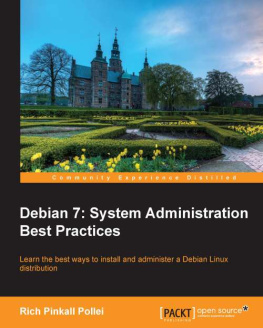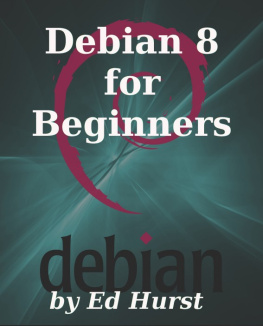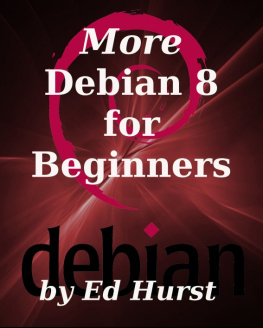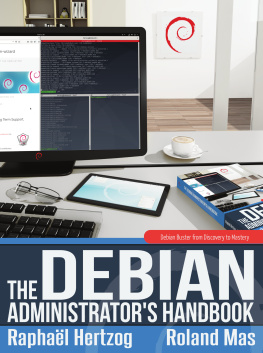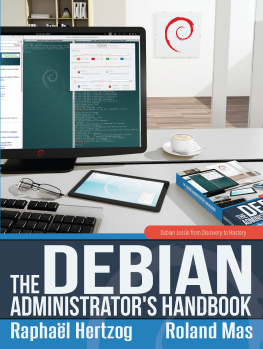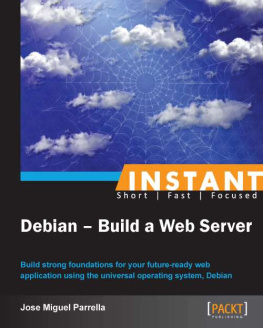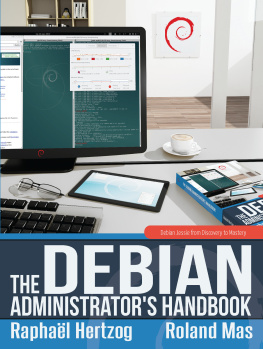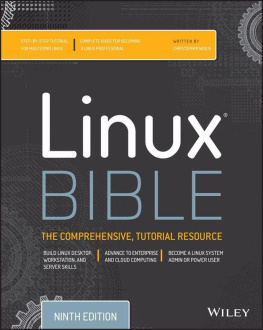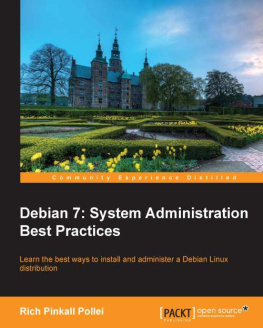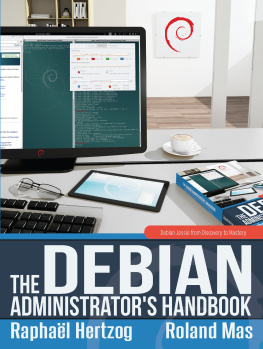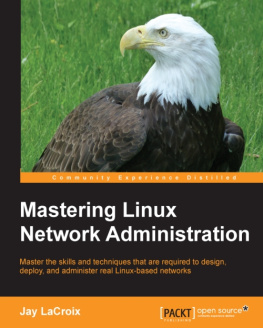Rich Pollei - Debian 7: System Administration Best Practices
Here you can read online Rich Pollei - Debian 7: System Administration Best Practices full text of the book (entire story) in english for free. Download pdf and epub, get meaning, cover and reviews about this ebook. year: 2013, publisher: Packt Publishing, genre: Romance novel. Description of the work, (preface) as well as reviews are available. Best literature library LitArk.com created for fans of good reading and offers a wide selection of genres:
Romance novel
Science fiction
Adventure
Detective
Science
History
Home and family
Prose
Art
Politics
Computer
Non-fiction
Religion
Business
Children
Humor
Choose a favorite category and find really read worthwhile books. Enjoy immersion in the world of imagination, feel the emotions of the characters or learn something new for yourself, make an fascinating discovery.
- Book:Debian 7: System Administration Best Practices
- Author:
- Publisher:Packt Publishing
- Genre:
- Year:2013
- Rating:4 / 5
- Favourites:Add to favourites
- Your mark:
Debian 7: System Administration Best Practices: summary, description and annotation
We offer to read an annotation, description, summary or preface (depends on what the author of the book "Debian 7: System Administration Best Practices" wrote himself). If you haven't found the necessary information about the book — write in the comments, we will try to find it.
Familiarize yourself with Debian 7 in record time using this comprehensive guide, and learn best practices the painless way through numerous examples and real-life situations. Invaluable for administrators and Debian users alike.
Overview
- An in-depth look at Debian administration subjects
- Discover what distinguishes Debian from other Linux distributions
- Learn how to install, maintain, and administer Debian Linux
In Detail
Debian is one of the most popular Linux-based operating systems, with over 37 thousand software packages available in several architectures. Debian 7 is the latest version of this universal operating system and provides the foundation for thousands of web servers. It is easy to install, stable, and provides mechanisms for system security.
Debian 7: System Administration Best Practices provides valuable background information, tips, and advice on the major areas of installing, maintaining, and administering Debian Linux, from single systems to clusters. Learn what makes Debian the most stable and popular Linux distribution for Internet sites.
Debian 7: System Administration Best Practices is an overview of what administrators need to know in order to effectively administer Debian Linux systems, providing guidance and advice on what is available, and what experience has shown to work best. Starting with what distinguishes Debian from other Linux distributions, you will learn about the Debian project. Learn about the ways systems are booted, and how best to lay out disk partitions, and the basic methods to install and configure Debian software packages. Discover how to manage Debian systems, from bootup to shutdown, and what security measures may be required for your peace of mind, as well as advice on advanced topics that include high availability clustering.
What you will learn from this book
- Learn how the new Universal Extensible Firmware Interface affects Linux installation
- Discover ways to lay out and organize disk storage
- Explore Debian package management features and maintenance
- Familiarize yourself with routine system management, including startup, shutdown, file maintenance, and display management
- Discover basic security practices, including user maintenance, firewalls, and special considerations for the root account
Approach
A step-by-step, example-based guide to learning how to install and administer the Debian Linux distribution.
Who this book is written for
Debian 7: System Administration Best Practices is for users and administrators who are new to Debian, or for seasoned administrators who are switching to Debian from another Linux distribution. A basic knowledge of Linux or UNIX systems is useful, but not strictly required. Since the book is a high level guide, the reader should be willing to go to the referenced material for further details and practical examples.
Rich Pollei: author's other books
Who wrote Debian 7: System Administration Best Practices? Find out the surname, the name of the author of the book and a list of all author's works by series.

